As official observers, staff from GCU’s Centre for Climate Justice attended the formal opening and sessions of COP26 and listened to world leaders outlining their vision for climate action. Our team are hard at organsing and attending side-events to make the case that there is a need to change the narrative and incorporate more human-centred approaches to climate action through climate justice.
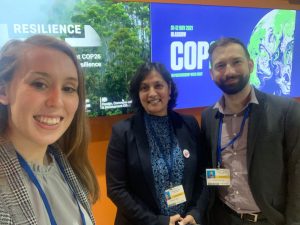
Climate justice recognises that the poorest and most vulnerable are bearing the brunt of climate change impacts despite contributing little to the problem. In order for this injustice to be rectified, solutions must have equity and inclusivity at their heart, and transformative and radical solutions must be embraced urgently if we are to achieve a climate just world. You can follow our team’s reflections on COP26 and activities through these blog posts.
On the first day, Professor Tahseen Jafry, Director of the Centre, officially opened the Resilience Hub; an initiative led by global non-state actors from business, investors, civil society, academia, cities and regions. The Resilience Hub is a platform to share best practice on adaptation and building resilience, forging collaborations, and open new opportunities for resilience and adaptation projects, and will help set the direction for further action on adaptation and resilience post-COP26. The Centre’s role in the Resilience Hub is to support it as Climate Justice Champions to help achieve a more resilient and climate just world. Click here to join the platform and the conversation.
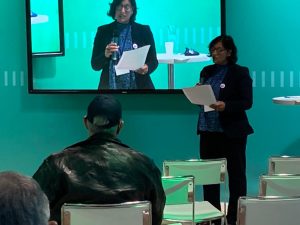
Our team also listened to the speeches of world leaders and activists at the World Leaders’ Summit running over the first two days of COP26. UK Prime Minister Boris Johnson talked about putting trust in science, and the UK’s goals to move away from coal, promote electric vehicles, increase finance for climate issues, and plant more trees. Our team reflected that climate action has been slow over the last 30 years despite strong scientific evidence so we will have to see whether the Prime Minister’s comment that “we know what the scientist have told us, and we know not to ignore them” translates into action. Nevertheless, it was encouraging to hear the acknowledgement that our responses to climate change need to be supported by finance and not just words, and that world leaders have a responsibility to the younger generations. Yet, throughout the speech, our team reflected the real question for climate justice was who the “we” in this conversation is? The Prime Minister acknowledged that developed countries must do more to tackle the climate crisis and must work with developing countries to get there. That said, the speech offered little detail on how this sentiment would be put into practice.
Yet the urgency for practical action to avoid dangerous levels of global warming was certainly clear, especially from leaders of climate-vulnerable nations. Prime Minister of Barbados Mia Mottley described a stark reality in which a2°C rise in global average temperature would amount to “a death sentence” for the people of Barbados. She asked the summit “Are we so blinded and hardened that we can no longer appreciate the cries of humanity?”
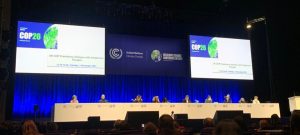
The question of who is “we” when it comes to the impacts of climate change is a critical issue that must be addressed at this summit if we are to take serious steps towards equitable climate action that reflect each nation’s responsibilities and capacity to act. Secretary General of the United Nations Antonio Guterres touched on this point when remarking that G20 countries represent 80% of global greenhouse gas emissions, and that coalitions between developed and developing countries are needed for everyone to recover from the climate crisis. The Secretary General committed to creating cleaner guidelines for countries wishing to turn their commitments into action, which was encouraging news, but the issue of political will and acknowledgement of responsibility by polluters remains an unanswered challenge. HRH Prince of Wales remarked on this that the Presidents and Prime ministers in attendance carry a heavy burden of responsibility but reminded the summit that the burden is heavier for those facing the impacts of climate change every day.
On the second day, our team attended the Presidency Dialogue with Indigenous Peoples, an open discussion in which Indigenous leaders shared vital messages and points of action directly to MP Alok Sharma, UK COP President, that they argued needs to be prioritised at COP26, namley; meaningful participation, equity, opportunities for dialogue and for Indigenous wisdom and knowledge to be used and valued. The leaders on the panel underlined that Indigenous peoples have solutions to the climate crisis, but they need to be listened to. Another critical message that was repeated by many was the need for a human rights-based approach to these issues. The human rights of Indigenous Peoples need to be safeguarded not just against the impacts of climate change, but rights need to be protected in relation to climate solutions too.
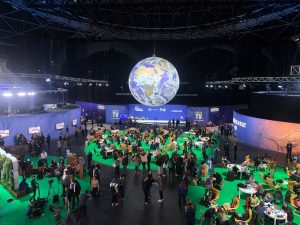
One of the most striking contributions came from young activists at the summit. Brianna Fruean (23) from Samoa highlighted that climate action can be and look vastly different from climate justice and urged those in positions of power to do more and do better. We have seen before that projects aimed at reducing emissions or adapting to extreme weather which were not designed with communities and with their needs and considerations in mind have been plagued by failures and even resisted by communities (an area of research by the Centre’s Dr Michael Mikulewicz – click here to learn more) . Txai Surui (24) from the Brazilan Amazon said her father told her to listen to the stars, moon, the wind, animals, and the trees, but now all of this is changing, the rivers are drying up, and animals are disappearing; “The earth is speaking to us, we have no more time”.
People’s Advocate Sir David Attenborough echoed this call for action. He drew attention to those who have contributed least to climate change are hit the hardest, and that we must share the costs and benefits of climate action. He noted that no ““advanced nation is yet sustainable” so no nation can rest on their laurels. Sir David Attenborough calls for our motivation to be hope and not fear, but a “desperate hope” summed up the situation facing this COP acutely. The essential arguments of climate justice, even while the term is not necessarily used, are filtering into the conversation – and our team at the Centre for Climate Justice will be engaging throughout this process to keep climate justice on everyone’s mind.
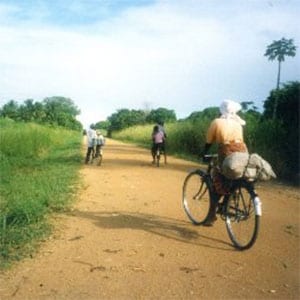
Be First to Comment